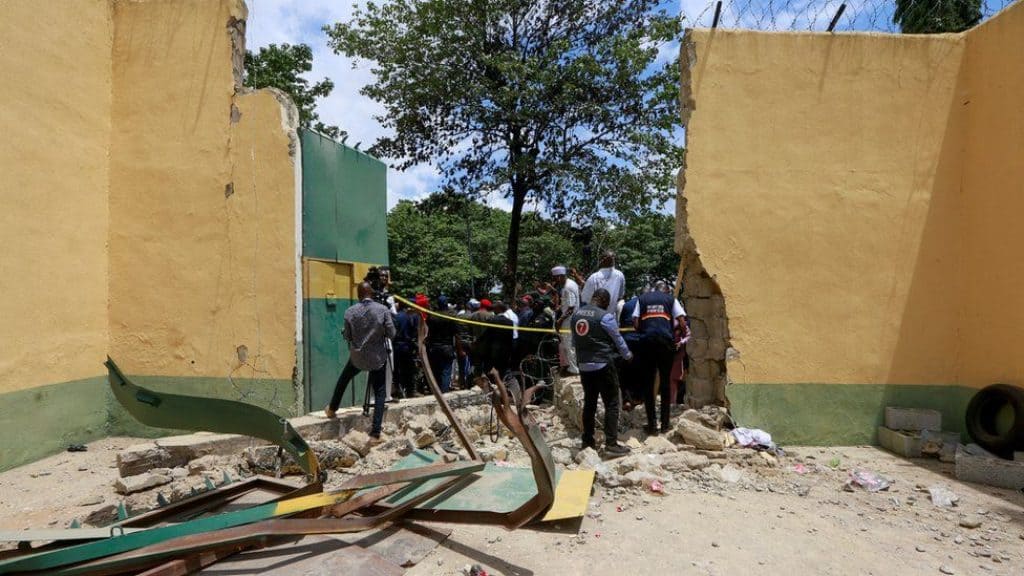
Last night, the Islamic State, on behalf of its West Africa Province (ISWAP), officially claimed a massive jailbreak that took place earlier this week near the Nigerian capital of Abuja. At least 800 prisoners were freed in that prison break, though at least 300 have already been recaptured or voluntarily surrendered themselves to law enforcement.
During the night of July 5, dozens of jihadists attacked the main prison facility in Kuje, Nigeria, a suburb on the outskirts of the capital city of Abuja. According to local reports, the attack lasted roughly 50 minutes, in which the jihadists also gave a religious lecture to the inmates before officially busting them out of the cells.
According to the Islamic State’s version of events, “soldiers of the Caliphate managed to storm the [Kuje] prison after destroying its gates and one of its side fences, followed by a clash with security forces inside the prison.”
The jihadist organization continues by saying this operation “managed to free dozens of prisoners, destroy parts of the prison, and burn down 8 vehicles, in addition to the killing and wounding of dozens of the prison’s guards.”
At least one guard and four inmates are confirmed to have died during the Islamic State’s raid.
The ISWAP fighters involved in the prison break reportedly used small arms and explosives to burst their way into the prison facilities. These reports were later seemingly confirmed in a short video released by the Islamic State itself. That video, released by the Islamic State’s Amaq News, also shows dozens of prisoners emerging freely from the prison.
The Kuje prison, which locals described as a medium security prison, housed many detained members of Nigeria’s various jihadist groups, including at least 64 high-profile members of the so-called ‘Boko Haram,’ a catch-all term in Nigeria for both ISWAP and its rival Jama’at Ahl al-Sunnah li-Da’wah wal-Jihad (JASDJ), which was formerly led by Abubakar Shekau.
According to Nigerian officials, the prison break was organized to free these individuals from the Kuje Prison. Details of who these individuals are or any additional high-profile jihadists formerly housed in the prison remain scarce.
Jailbreaks in Nigeria are not uncommon, as local researchers have stated “at least over 4,300 inmates have escaped from the country’s prisons since 2017.” For instance, in April of last year, unidentified gunmen freed almost 2,000 inmates in Nigeria’s southeastern Imo State. And last October, another jailbreak in Nigeria’s southwestern Oyo State freed another 800 inmates.
However, this week’s massive prison break is likely the first to take place inside the Nigerian capital, further raising concerns over the country’s overall capabilities to effectively combat and contain its jihadist insurgencies.
Nigeria continues to face the primarily ISWAP and JASDJ-driven insurgencies in its northeast, though this violence has recently been creeping into more southern and central states. For instance, the Islamic State claimed a string of attacks in Nigeria’s central Kogi State earlier this year.
Meanwhile, Nigeria is also facing a worsening crisis in its northwest, which is fueled by communal violence and banditry, which jihadists, particularly from al-Qaeda’s Nigerian wing, locally known as Ansaru, are also making inroads.
Jailbreaks can often act as a boon for jihadists. In addition to the major propaganda value of such operations, jailbreaks can swell ranks, reinforce capabilities by freeing more highly-trained individuals, and provide new senses of direction by freeing leaders or key personnel.
It is for these reasons that jailbreaks are a major part of the Islamic State’s overall global strategy and are often called for by the group’s central leadership. In recent years, the group has also mounted significant prison breaks in northeastern Syria and in eastern Congo. And recent operational expansions by the Islamic State in Mozambique has raised fears of future jailbreak attempts in Mozambique’s northern Cabo Delgado Province in order to act as a boon for its efforts there.
It is too early to tell what the long-term impacts will be of this week’s jailbreak in central Nigeria. However, with the immediate optics of such an operation, as well as the aforementioned possible consequences for jihadist organizations, it does not bode well for the future security of the country.
At the very least, the Kuje prison break shows Nigeria, as well as its allies, that much work remains in countering the threat of jihadists throughout the country and now even inside Nigeria’s capital itself.







